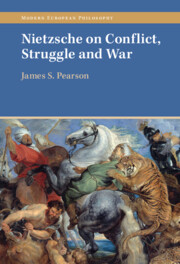Book contents
- Nietzsche on Conflict, Struggle and War
- Modern European Philosophy
- Nietzsche on Conflict, Struggle and War
- Copyright page
- Contents
- Abbreviations
- Translations
- Acknowledgments
- Introduction
- Part I Agon Versus War
- Part II The Struggle for Organization
- Chapter 3 Conflictual Unity in the Untimely Meditations
- Chapter 4 Organizational Struggle in the Later Nietzsche
- Conclusion
- References
- Index
Chapter 4 - Organizational Struggle in the Later Nietzsche
from Part II - The Struggle for Organization
Published online by Cambridge University Press: 16 June 2022
- Nietzsche on Conflict, Struggle and War
- Modern European Philosophy
- Nietzsche on Conflict, Struggle and War
- Copyright page
- Contents
- Abbreviations
- Translations
- Acknowledgments
- Introduction
- Part I Agon Versus War
- Part II The Struggle for Organization
- Chapter 3 Conflictual Unity in the Untimely Meditations
- Chapter 4 Organizational Struggle in the Later Nietzsche
- Conclusion
- References
- Index
Summary
This chapter analyzes how the later Nietzsche proposes we resolve the pathological fragmentation that he sees threatening both modern individuals and communities. I reconstruct how, within his theory of the will to power, he develops a novel account of healthy organization – one purged of the problematic metaphysical presuppositions that compromised his earlier synthetic program (outlined in Chapter 3). Against his agonistic readers, I argue that his later theory of organization still comprises a combination of instrumentalization and exclusion that renders it incompatible with his notion of agonal conflict. I examine how he concretely applies this abstract theory of organization to the problems of individual and collective disintegration. With regard to his account of self-cultivation, I contest those who construe Nietzsche as a thinker who prescribes the sublimation, but not the elimination, of troublesome psychological drives. With regard to his theory of collective organization, I take issue with both his agonistic and his radical aristocratic readers. My contention is that each group of interpreters unduly distorts Nietzsche’s political outlook, making it appear either far softer or more brutal than is in fact the case.
- Type
- Chapter
- Information
- Nietzsche on Conflict, Struggle and War , pp. 184 - 268Publisher: Cambridge University PressPrint publication year: 2022

